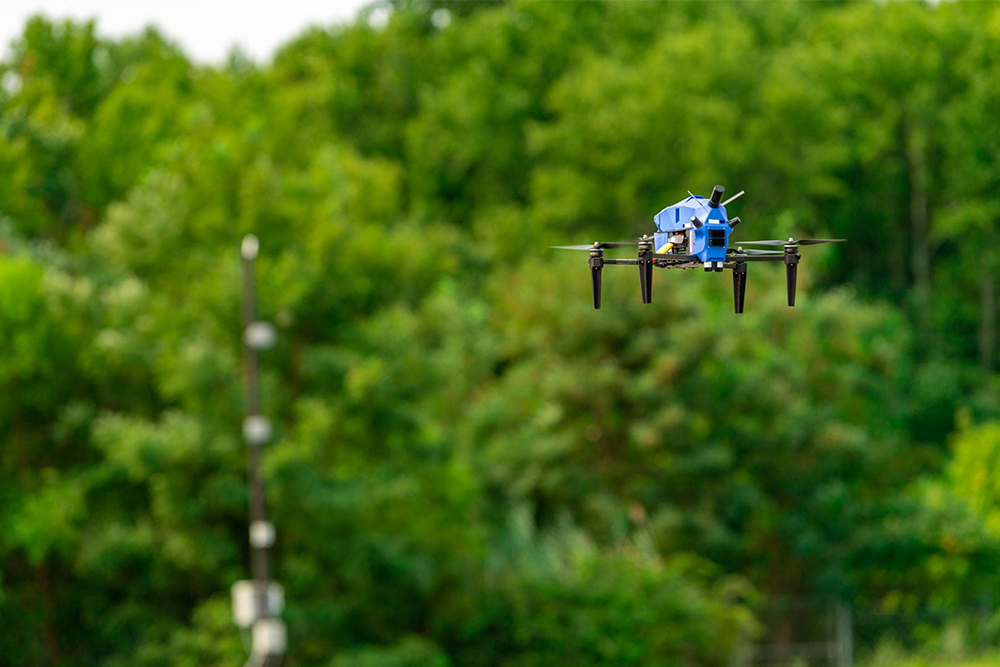
|
 |
Uncrewed aerial vehicles, or drones, can potentially be equipped with sensors that detect physiological traces of injury.
|
|
A multi-institutional team led by the University of Maryland (UMD) has been selected for the DARPA Triage Challenge, in which participants compete to develop novel methods of detecting injuries, particularly in mass casualty incidents, so that medical personnel can respond more quickly, efficiently, and precisely.
Dubbed RoboScout DTC, the UMD team will be part of the Systems Competition, one of three competitions in the Triage Challenge, and will focus its efforts on primary triage, in which medical personnel seek to identify and treat those most urgently in need of care.
In mass casualty incidents, whether civilian or military, triage needs often outstrip resources and place enormous strains on medical personnel. DARPA hopes to ease this burden by equipping uncrewed aerial vehicles (UAV), or drones, with stand-off sensors—that is, sensors capable of detecting subtle changes in heat or energy from a distance—and feeding the data to machines trained with perceptual algorithms.
RoboScout DTC is bringing together experts on robotics and automation, UAV ops, machine learning, and medical sensing to help make this vision a reality. One of only three university teams selected for funding by DARPA, it is led by Derek Paley, who is the Willis H. Young. Jr. professor of aerospace engineering education at UMD and also directs the Maryland Robotics Center (MRC), a research hub housed in the Institute for Systems Research.

Derek A. Paley, Willis H. Young, Jr. Professor of Aerospace Engineering Education and Director, Maryland Robotics Center
He will be supported in the effort by the drone ops team at the UMD UAS Research and Operations Center and its chief pilot, RoboScout DTC co-PI Darren Robey. UROC, which also collaborates with Paley and the Army Research Lab as part of the multi-institutional AI and Autonomy for Multi-Agent Systems (ArtIAMAS) program, has pioneered a number of novel UAS applications, including in environmental monitoring and delivery of organs for transplant.
UMD Distinguished University Professor Dinesh Manocha (computer science/electrical and computer engineering) is also a co-PI, bringing his long-standing expertise on perception-based machine learning and multi-agent coordination to the endeavor. Manocha will train perception algorithms to integrate data from multiple stand-off sensor streams to generate assessment of injuries in real time.
Other key personnel include Bruce Lynch, director of USAF CSTARS Baltimore, and Sarah Murthi, a University of Maryland Medical System (UMMS) surgeon and assistant professor at University of Maryland Shock Trauma. Both will contribute their expertise on medical sensing and triage procedures.
“Being selected for the DARPA Triage Challenge is an honor and an opportunity to showcase the aerial and ground autonomy capabilities that MRC has developed over the past few years of working with our local partners at the Army Research Laboratory,” Paley said. “Especially new and exciting is the partnership we’ve established with UMMS to be able to equip our drones and robots with state-of-the-art algorithms for assessment of vital signs and injuries.”
“The fundamental research results generated by participating in this challenge have the potential to improve first responders’ ability to provide life-saving interventions in mass casualty incidents,” he said.
Related Articles:
An Internship with Impact
The Modern Battle for Maryland’s Oysters
Extreme Drone Ops: Measuring Ice Packs
UMD Researchers Eye Advances in Autonomy
MRC and MAGE Earn ARM Institute Endorsement
Using underwater robots to detect and count oysters
Bee drones featured on new Voice of America video
Perception and Robotics Group creates hive of ideas for drones
New undergraduate minor in robotics and autonomous systems
MRC Seminar Series Starts with Jellyfish-Inspired Robotics
November 14, 2023
|

